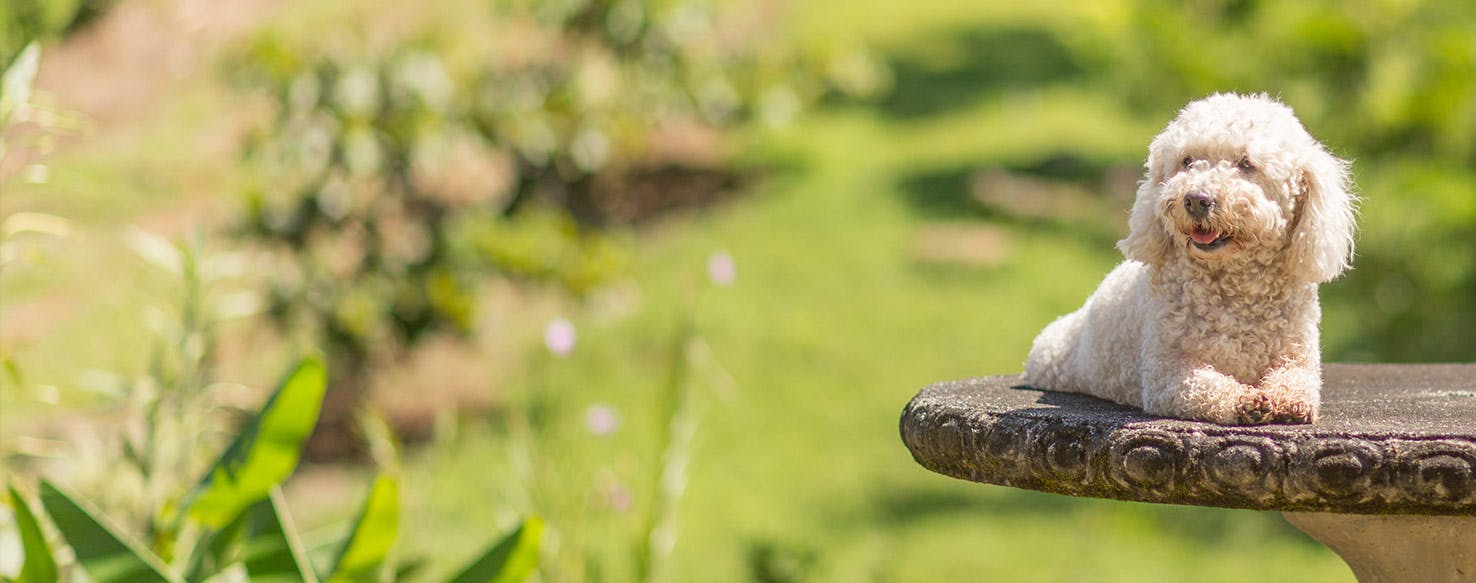- Home
- The Daily Wag!
- Behavior
- Why Do Bichon Frises Bite Their Paws

Common
Concerning
What is that slurping noise? It’s your dog. If you have become irritated with your Bichon Frise chewing his paws and making gross noises as he does it, you are not alone. Pet parents often observe the common behavior of their dog chewing their paws. However, it’s usually for just a few moments. Occasional paw chewing is usually caused by temporary discomfort or itching. Excessive paw chewing is when a pet parent should become concerned. Continuous chewing and licking of the paws can cause irritation, inflammation and infection. If you are ready to find out why your dog is chewing his paws excessively, continue reading below.
As soon as you notice your dog is chewing his paws you need to immediately investigate. Carefully look at your dog’s paws and in between the toes. Using a flashlight is helpful when trying to see through long thick hair. If you notice a bite from a flea, tick, or other insects, you found the cause. However, if there is no evidence of an exterior issue, the cause can be hidden. Sometimes paw chewing is linked to emotional issues in canines. Usually, depression, separation anxiety, and stress are the main causes of emotional chewing. In this situation, your dog is nervous and is trying to release his negative energy as well as soothe himself from his stressful feelings. If your dog tends to chew his paws when you are away from the house, chances are he is experiencing separation anxiety. Veterinarians diagnose dogs with allergies every day. Dogs often experience food allergies and symptoms without their pet parents realizing the issue. If you have recently changed your dog’s food or diet in any way, there’s a possibility he could be having an allergic reaction to his new food.
Boredom is common in dogs that have high energy levels and no outlet to release their feelings. There is a reason dogs enjoy playing with toys and running around the house and outdoors. They are enjoying life, exercising, and staying busy. Bichon Frises are intelligent dogs that require entertainment and mental stimulation to keep them healthy both mentally and physically. Exposure to harsh chemicals that come in direct contact with your dog's paws is another common issue for canines that play outdoors. Your lawn care products should always be pet-friendly and organic to avoid irritation and paw chewing. It is also essential to switch to safer products to reduce the risk of toxic poisoning from chemicals used in popular lawn care products.
Need advice about your pet's health?
Get answers fast from a veterinary professional 24/7 in the Wag! App.
Get Vet ChatAs a pet parent, you never want to encourage your dog to chew his paws. Excessive chewing can lead to infection, discomfort, and pain. Dogs that chew excessively often feel uncontrollable and accidentally bite their paw pads, toes, and top of their paws which draws blood and later becomes infected. You want your dog to stop chewing his paws the moment you notice him starting to do it. Speaking calmly and being patient with your dog is recommended when discouraging this behavior. Calmly sit next to your dog and slowly take a look at his paws to inspect them. If you find any issues or see anything unusual you should consult with a veterinarian immediately.
Sometimes dogs get small twigs, dirt, and other debris stuck in between their toes or stuck in their paw pad. A punctured paw pad is often accompanied with small whines due to the pain. If any object is stuck in your dog’s paw or skin in the surrounding area, you should allow a veterinairan to remove it professionally. A veterinarian will also provide topical treatment to prevent infection and help the wounded area heal properly. Discussing your dog’s behavior issues with a professional trainer is also helpful in this situation. Professional dog trainers provide insight into the situation and often provide training techniques and lifestyle changes that help dog’s cope with their stress and anxiety.
Dog owners usually know their pets the best. If you are an experienced pet parent that notices the smallest details about your dog’s behavior, you might be able to determine the cause of the paw chewing on your own. Writing down the triggers that cause your dog to chew his paws is essential to finding the cause of the behavior. Quietly observe your dog throughout the day and take note of the surroundings in the environment and the action your dog took immediately before he starts chewing on is paws. Does he chew his paws as soon as he enters the house from playing outside in the yard? Does he chew his paws after he eats? These are all signs that can lead you directly to the cause.
Excessive paw chewing in any dog can lead to a serious issue such as an infection or injury. Always consult with a veterinarian if you are unable to determine the cause and treat the situation at home. Some dogs are magicians and hide the cause fairly well. A professional can help you discover the mystery and treat it properly and quickly.
Written by a Cocker Spaniel lover Shellie Sutera
Veterinary reviewed by:
Published: 04/26/2018, edited: 01/30/2020
More articles by Shellie Sutera
